

Charles Bukowski. Thomas Sowell. American economist, social theorist, political philosopher and author Thomas Sowell (; born June 30, 1930) is an American economist and social theorist who is currently a senior fellow at the Hoover Institution at Stanford University.
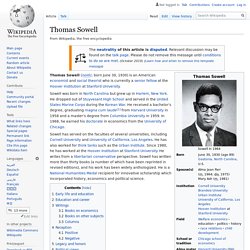
Sowell has served on the faculties of several universities, including Cornell University and University of California, Los Angeles. Murray Rothbard. Rothbard was a heterodox political economist.[18][19] Economist Jeff Herbener, who calls Rothbard his friend and "intellectual mentor", wrote that Rothbard received "only ostracism" from mainstream academia.[20] Rothbard rejected mainstream economic methodologies and instead embraced the praxeology of his most important intellectual precursor, Ludwig von Mises.
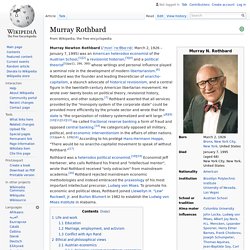
To promote his economic and political ideas, Rothbard joined Llewellyn H. "Lew" Rockwell, Jr. and Burton Blumert in 1982 to establish the Ludwig von Mises Institute in Alabama. The 'neo-fascist' Dark Enlightenment is more sad than scary. The good old days.
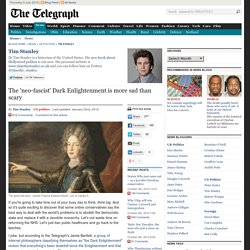
James Francis Edward Stuart, son of James II. If you're going to take time out of your busy day to think, think big. And so it's quite exciting to discover that some online conservatives say the best way to deal with the world's problems is to abolish the democratic state and replace it with a Jacobite monarchy. Hans-Hermann Hoppe. Ludwig von Mises. This article is about the Austrian economist.
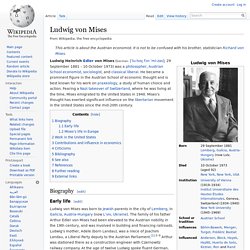
It is not to be confused with his brother, statistician Richard von Mises. Ludwig Heinrich Edler von Mises (German: [ˈluːtvɪç fɔn ˈmiːzəs]; 29 September 1881 – 10 October 1973) was a philosopher, Austrian School economist, sociologist, and classical liberal. Jared Taylor. Taylor and many of the organizations he is associated with are often described as promoting racist ideologies by, among others, civil rights groups, news media and academics studying racism in the US.[4][5][6][7] Early life[edit] Born to missionary parents in Japan,[8] Taylor lived there until he was 16 years old.
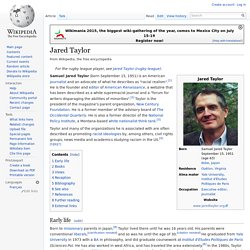
His parents were conventional liberals,[clarification needed] and so was he until the age of 30. [citation needed] He graduated from Yale University in 1973 with a BA in philosophy, and did graduate coursework at Institut d'Etudes Politiques de Paris (Sciences Po). Jared Taylor. Taylor and many of the organizations he is associated with are often described as promoting racist ideologies by, among others, civil rights groups, news media and academics studying racism in the US.[4][5][6][7] Early life[edit] Born to missionary parents in Japan,[8] Taylor lived there until he was 16 years old.
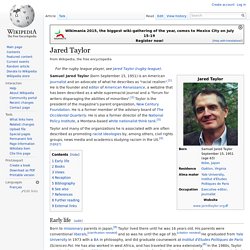
Joseph Bingham. Joseph Bingham (September 1668 – 17 August 1723), was an English scholar and divine.
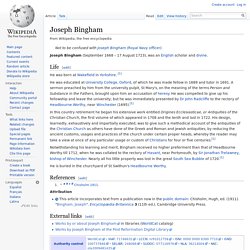
Laura Ingalls Wilder. Laura Ingalls Wilder[2] (/ˈɪŋɡəlz/; February 7, 1867 – February 10, 1957) was an American writer, most notably the author of the Little House on the Prairie books of children's novels based on her childhood in a settler family.[3] Her daughter, Rose Wilder Lane, encouraged her to write and helped her to edit and publish the novels.
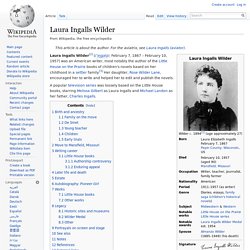
Birth and ancestry[edit] Laura Ingalls Wilder was born on February 7, 1867, seven miles north of the village of Pepin in the Big Woods region of Wisconsin,[4] to Charles Phillip Ingalls and Caroline Lake (Quiner) Ingalls. She was the second of five children, following Mary Amelia, who went blind in her teens. Arthur Pink. Arthur Walkington Pink (1 April 1886 – 15 July 1952) was an English Christian evangelist and biblical scholar who was known for his staunchly Calvinist and Puritan-like teachings in an era dominated by opposing theological traditions.
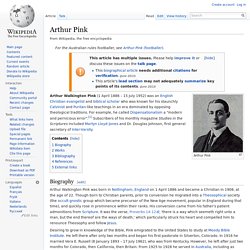
For example, he called Dispensationalism a "modern and pernicious error".[1] Subscribers of his monthly magazine Studies in the Scriptures included Martyn Lloyd-Jones and Dr. Douglas Johnson, first general secretary of Inter-Varsity. Biography[edit] Arthur Walkington Pink was born in Nottingham, England on 1 April 1886 and became a Christian in 1908, at the age of 22. Though born to Christian parents, prior to conversion he migrated into a Theosophical society (the occult gnostic group which became precursor of the New Age movement, popular in England during that time), and quickly rose in prominence within their ranks. Desiring to grow in knowledge of the Bible, Pink emigrated to the United States to study at Moody Bible Institute. Cornelius Van Til. Cornelius Van Til (May 3, 1895 – April 17, 1987) was a Christian philosopher, Reformed theologian, and presuppositional apologist.
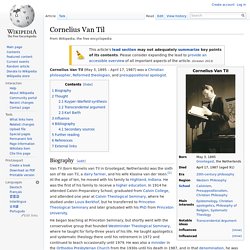
Biography[edit] Van Til (born Kornelis van Til in Grootegast, Netherlands) was the sixth son of Ite van Til, a dairy farmer, and his wife Klasina van der Veen.[1] At the age of ten, he moved with his family to Highland, Indiana. He was the first of his family to receive a higher education. Henry M. Morris. Henry Madison Morris (October 6, 1918 – February 25, 2006) was an American young earth creationist, Christian apologist, and engineer.
He was one of the founders of the Creation Research Society and the Institute for Creation Research. He is considered by many to be "the father of modern creation science. Nancy Pearcey. Nancy Randolph Pearcey (born 1952) is an American evangelical author on the Christian worldview.[1] Education[edit] Pearcey earned a BA from Iowa State University and an MA in Biblical Studies from Covenant Theological Seminary in St. Louis, Missouri. David A. Noebel. David A. Noebel (born August 27, 1936) is an American religious leader and writer. He is the former director of Summit Ministries, in Manitou Springs, Colorado in the United States.[1] Since the 1960s, he has written widely on the relationship between religion and popular culture, and is an outspoken critic of secular humanism,[2] which he describes as unscientific and a religion.[3] Noebel was a former Associate Evangelist of Billy James Hargis's Christian Crusade.[4] Noebel served as vice-president and president of American Christian College, which Hargis had founded in 1971 in Tulsa, Oklahoma.
It closed in 1977, three years after Hargis resigned following allegations of sexual conduct against Hargis. He was a member of the Council for National Policy beginning in 1984, and a candidate for Congress against Rep. Richard Wurmbrand. William Lane Craig. Charles Murray (political scientist) Rousas Rushdoony. Michael Pollan. Paulo Coelho. §Biography[edit] Paulo Coelho was born in Brazil[2] and attended a Jesuit school. As a teenager, Coelho wanted to become a writer. i Upon telling his mother this, she responded with "My dear, your father is an engineer.
Norman Vincent Peale. Mircea Eliade. Karl Marx. Charles Dickens. Fulton J. Sheen. Fyodor Dostoyevsky. Leo Tolstoy. Ernest Hemingway. Jorge Luis Borges.